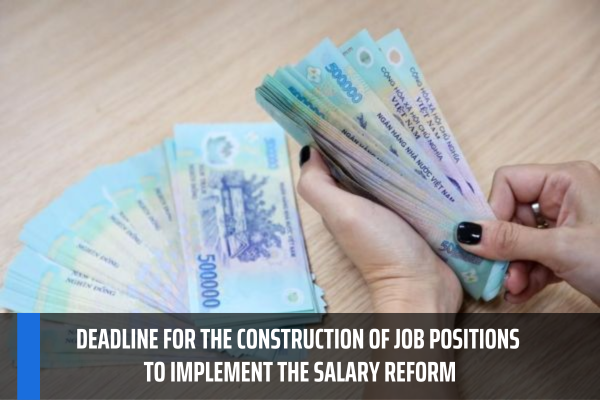Is there a specific deadline for the construction of job positions to implement the salary reform in Vietnam? Are there 05 new salary schedules based on job positions when the salary reform comes into force from July 1, 2024?
Is there a specific deadline for the construction of job positions to implement the salary reform in Vietnam?
The Government has recently issued Resolution 01/NQ-CP on the tasks and key solutions for implementing the Economic-Social Development Plan and State Budget Estimate for 2024.
According to the resolution, there will be a synchronized, comprehensive, and effective implementation of salary policy reforms based on Resolution 27-NQ/TW 2018 of the Central Executive Committee on salary policy reforms for officials, public employees, armed forces, and workers in enterprises.
The construction of job positions for officials and public employees in the state administrative system will be completed before March 31, 2024. Additionally, clear responsibilities will be assigned to each ministry, sector, locality, and their respective leaders to serve as the basis for implementing the salary policy reforms from July 1, 2024.
Source: Government Portal

Is there a specific deadline for the construction of job positions to implement the salary reform in Vietnam? Are there 05 new salary schedules based on job positions when the salary reform comes into force from July 1, 2024?
Are there 05 new salary schedules based on job positions when the salary reform comes into force from July 1, 2024?
According to Clause 1, Article 3 of Resolution 104/2023/QH15, the resolution states the following regarding the implementation of salary policy:
From July 1, 2024, a comprehensive reform of the salary policy will be implemented in accordance with Resolution 27-NQ/TW dated May 21, 2018, of the 7th Plenum of the 12th Central Executive Committee (Funding for the salary reform will be ensured from the accumulated salary reform fund of the central budget, local budgets, and a portion allocated in the state budget expenditure plan). This includes adjusting pensions, social insurance allowances, monthly allowances, preferential allowances for those who have rendered meritorious services, and certain social welfare policies linked to the statutory pay rate.
Therefore, the salary reform for officials, public employees, and armed forces personnel will officially take effect from July 1, 2024, based on Resolution 27-NQ/TW 2018.
In Resolution 27-NQ/TW 2018, it is stated that there will be the construction of 05 new salary schedules based on job positions for officials, public employees, and armed forces personnel.
The 05 new salary schedules for officials, public employees, and armed forces personnel are as follows:
Table 01: Salary schedule for leadership positions (elected and appointed) within the political system, from central to commune level.
Table 02: Salary schedule for specialized and professional positions, based on job positions for officials and professional job titles for public employees without leadership positions.
Table 03: Salary schedule for military officers, officers, and police officers based on ranks or military titles.
Table 04: Salary schedule for professional and technical military personnel and police officers.
Table 05: Salary schedule for defense and police workers (with a correlation between the salary of armed forces personnel and current administrative officials).
However, the specific details of the salary schedules have not been drafted or officially regulated for the 05 new salary schedules applied to officials, public employees, and armed forces personnel.
According to the spirit of Resolution 27-NQ/TW 2018, the design and development of the 05 new salary schedules for officials, public employees, and armed forces personnel will be based on the following factors:
- Annuling the current statutory pay rate and salary coefficient, and establishing a specific basic salary amount in the new salary schedule.
- Implementing a unified labor contract regime in accordance with the provisions of the Labor Code (or service provision contract) for individuals performing redundant and service jobs (requiring training below intermediate level), without applying the officials and public employees salary schedule to these individuals.
- Determining the minimum salary level for officials and public employees in the public sector as the salary level for individuals performing jobs requiring intermediate level training (level 1), which should not be lower than the minimum salary level for trained workers in the business sector.
- Expanding the wage relationship as a basis for determining specific salary levels in the salary schedule system, gradually approaching the wage relationship in the business sector that is suitable for the state's resources.
- Improving the system of regular wage increases and premature salary increases for officials, public employees, and armed forces personnel in accordance with the provisions of the new salary schedule.
Vietnam: Who are officials?
- Pursuant to the provisions of Clause 1, Article 4 of the Law on Officials 2008, cadres are Vietnamese citizens who are elected, approved and appointed to hold posts or titles for a given term of office in agencies of the Communist Party of Vietnam, the State, socio-political organizations at the central level, in provinces and centrally run cities (below collectively referred to as provincial level), in districts, towns and provincial cities (below collectively referred to as district level), included in the payrolls and salaried from the state budget.
- Pursuant to the provisions of Clause 2, Article 4 of the Law on Officials 2008, amended by Clause 1, Article 1 of the Law on amendments to the Law on Officials and the Law on Public Employees 2019, Civil servants are Vietnamese citizens who are recruited and appointed to ranks, posts or titles in agencies of the Communist Party of Vietnam, the State, socio-political organizations at the central, provincial and district levels; in People’s Army agencies and units, other than officers, professional military personnel and defense workers; in People’s Police offices and units other than officers and professional non-commissioned officers, included in the payrolls and salaried from the state budget.
LawNet
